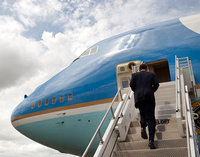Contrary to what opponents of a military intervention in Libya are claiming, the U.S. is not at war with Libya. In fact, it’s very possible that the U.S. will not even be directly engaged in any eventual acts of war against Libya. And though endgames, outcomes and objectives are valid concerns and necessary considerations, much of the hand-wringing is premature. The U.N. Security Council resolution will allow outside powers to target Moammar Gadhafi’s air and ground forces to keep them from delivering the final blow that was all but imminent even as the council voted on the measure last night. […]
U.S. Foreign Policy Archive
Free Newsletter
Next week the United States will mark the 8th anniversary of the invasion of Iraq — widely considered one of the worst foreign policy disasters in American history. Meanwhile, more than 100,000 U.S. troops remain mired in Afghanistan, nine years after the Taliban were toppled from power. Both conflicts are daily reminders that the use of U.S. military force can have unforeseen and often unpredictable consequences. For that reason, force should be considered only in the most pressing of national security circumstances. Unfortunately, if the response to the uprising in Libya is any indication, it seems many members of the […]
Just a few final thoughts on the opportunity I believe we missed in Libya. To begin with, many of the counterarguments to a U.S. military intervention are sound. As I’ve already agreed, a no-fly zone is unlikely to be decisive. The same holds true for a limited air strike of the kind I suggested. The advantage of the latter is that it very clearly signals our support for the anti-Gadhafi forces, who we could then supply with less-visible logistical and material support, while allowing us to avoid the long-term commitment of forces and resources of a no-fly zone. But in […]

If President Barack Obama’s handling of the events in Libya exemplifies his own definition of a “post-American world,” then we have moved past a G-Zero reality, which is how Nouriel Roubini and Ian Bremmer described a G-20 that can’t agree on how to rebalance global power, and into what I would describe as the “G-Less-Than-Zero” world, where America purposefully abdicates its global leadership role. A realist reading would present Obama as having committed himself to economic renewal at home while contenting himself with just nudging events abroad. Indeed, that’s basically what the buried headline of his 2010 National Security Strategy […]

The CNN effect is alive and well in 2011, even if its 2.0 incarnation might now be labeled the Al-Jazeera effect. The fact that U.S. President Barack Obama and British Prime Minister David Cameron are now talking about a “full spectrum of possible responses” to support the opposition to Libyan leader Moammar Gadhafi and NATO is considering endorsing a “no-fly zone” over the embattled North African state — even as the war in Afghanistan rages and Iraq is far from settled — testifies to the ongoing power of the global media to drive even a superpower’s foreign policy agenda. But […]
I have to admit that I have been very tempted by the argument — best expressed, to my mind, by Thomas P.M. Barnett, here and here — that the U.S. should take some sort of military action to make sure that Moammar Gadhafi does not hold onto power in Libya. The idea that there are no American interests at stake is based on such a narrow definition of American interests that I find it not very compelling at all. And the calls for restraint, while sound as a guide to U.S. policy in general, seem strikingly out of place here. […]
I had the pleasure of taking part in France 24’s panel discussion program, The World This Week, on Friday. The other guests were Matthew Saltmarsh of the IHT, Billie O’Kadameri of Radio France International and Simon Kuper of Financial Times. The discussion focused on events in Libya, but we also covered Ivory Coast and the resignations of former French Foreign Minister Michele Alliot-Marie and former German Defense Minister Karl-Theodore zu Guttenberg. Part one can be found here. Part two can be found here. I recommend the discussion on Libya in particular, because Billie O’Kadameri offered some very useful insights into […]

Who’s in charge in North Korea? Contrary to what some news coverage has suggested in recent months, the answer is obvious: Kim Jong Il. Ever since the North Korean leader suffered a stroke in the summer of 2008, media reports have been rife with speculation that he would soon give way to a successor, or else that a struggle for power was raging in Pyongyang. Much of that speculation was idle, little of it informed, and some of it motivated. North Korea may be opaque, but this much is clear to close observers of its hermetic ruling circles: In January […]
Events in Libya are a further reminder for Americans that we stand at a crossroads in our continuing evolution as the world’s sole full-service superpower. Unfortunately, we are increasingly seeking change without cost, and shirking from risk because we are tired of the responsibility. We don’t know who we are anymore, and our president is a big part of that problem. Instead of leading us, he explains to us. Barack Obama would have us believe that he is practicing strategic patience. But many experts and ordinary citizens alike have concluded that he is actually beset by strategic incoherence — in […]

Unlike the successful uprisings in neighboring Tunisia and Egypt, characterized by largely unarmed protests and government crackdowns with tear gas and bullets, Libya is now in the midst of a full-bore violent civil war. Refusing to stand down, Col. Moammar Gadhafi has vowed “to fight until the last man and last woman to defend Libya from east to west, north to south.” While rebel forces have taken control of many town and cities, forces loyal to Gadhafi firmly control Tripoli, the country’s capital, and have started to contest the rebels’ control of strategic town and cities over the past week. […]
This report by the Russian government-owned English-language television station Russia Today covers U.S. Secretary of State Hillary Clinton’s appearance last week on Capitol Hill. The report highlights Clinton’s request to U.S. Congress for more funding to promote America’s agenda abroad and asserts that she lamented about foreign-owned English-language media putting home-grown U.S. news networks to shame.
There’s so much to love about Charlie Sheen’s diatribes that about the only improvement I can think of would be to have Jean-Claude Van Damme be the one interviewing him. Obscured by the spectacle of Sheen’s crash-and-burn party are some very serious critiques of the consensus drug treatment paradigm in the U.S. But there are also some very important insights into U.S. foreign policy and national security. In particular, Sheen’s remarks, which I’m tempted to refer to as the Sheen Doctrine, illustrate one tendency prevalent on the left and another prevalent on the right, while succinctly articulating a major tenet […]
